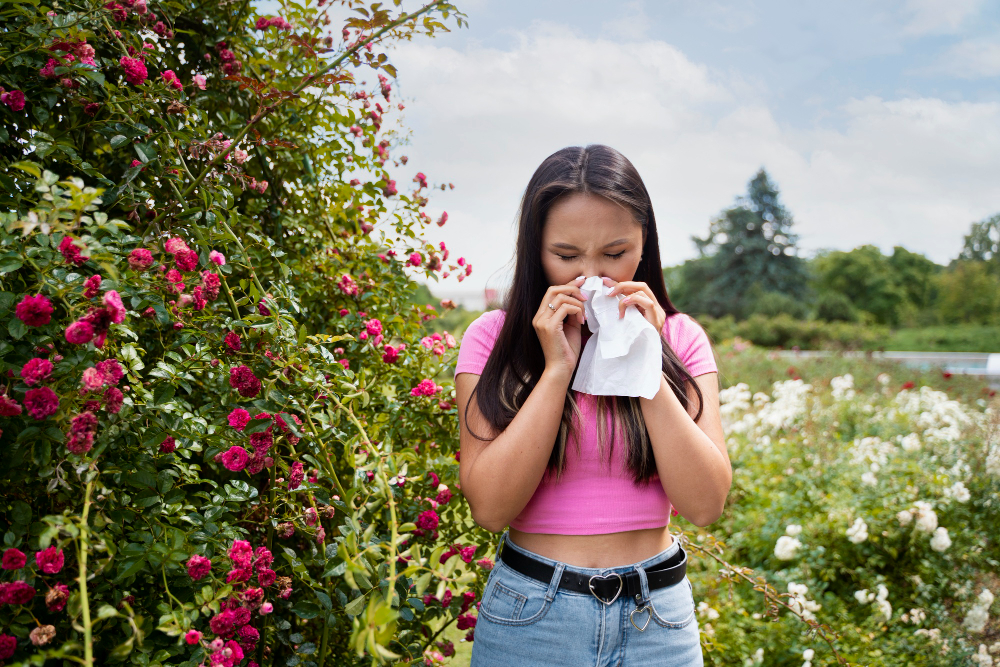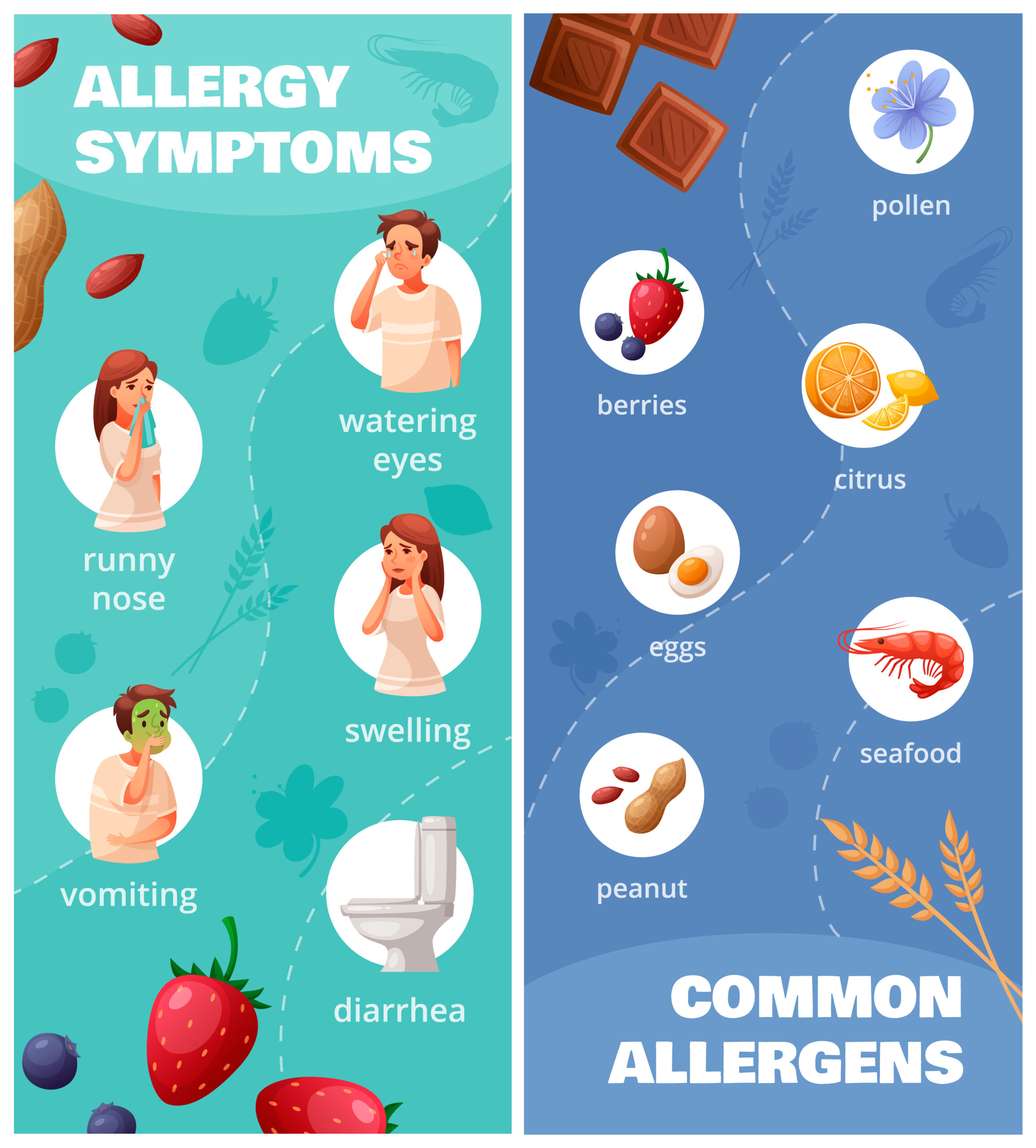How to Deal With Allergies in Spring
Spring arrives with a burst of life, painting the world in vibrant colors and bringing longer, warmer days. However, due to the increased pollen in the air, this season also marks the onset of uncomfortable allergy symptoms for many people.
Seasonal allergies can significantly impact daily life, leading to sneezing, itchy eyes, runny nose, and fatigue, which can interfere with work, school, and outdoor activities.
Addressing these allergies is crucial for maintaining overall health and well-being, as untreated seasonal allergies can lead to more severe health issues over time.
For those seeking comprehensive allergy care, CityDoc offers extensive allergy-testing and management solutions tailored to individual needs, providing relief and enabling everyone to enjoy the beauty of spring without the discomfort of allergies.

Does Spring Cause Allergies: Understanding This Seasonal Allergy
Spring allergies are primarily triggered by the increase in pollen from trees, grasses, and weeds as they blossom in warmer weather.
The reason we get allergies in the spring has much to do with the widespread dissemination of these tiny, lightweight pollen particles, which are easily inhaled or come into contact with the eyes and skin.
In addition to pollen, mold spores can increase in damp, mild spring conditions, contributing to the array of allergens in the environment.
When individuals with sensitive immune systems encounter these allergens, their bodies mistakenly identify them as harmful invaders, triggering an allergic reaction. This reaction involves the production of antibodies, specifically Immunoglobulin E (IgE), which releases histamine.
Histamine is the compound responsible for the familiar symptoms of seasonal allergies, such as sneezing, itchy and watery eyes, a runny or blocked nose, and sometimes even skin rashes.
Understanding what causes seasonal allergies in the spring, particularly the role of pollen and mold, is crucial for finding effective management and treatment solutions to mitigate the discomfort and health impacts of these allergens.
Identifying Your Allergens: How and Why Do We Get Allergies in Spring?
Knowing your specific allergy triggers is vital in effectively managing and treating allergies, especially during the challenging spring season when allergens are at their peak.
Identifying what causes your allergic rhinitis or hay fever explicitly—whether it’s tree pollen, grass pollen, weed pollen, or mold spores—enables tailored treatment plans that can more effectively alleviate symptoms and improve your quality of life.
Several methods for identifying these triggers include detailed allergy testing, which can pinpoint the specific allergens that cause your symptoms. Observing when and where your symptoms worsen can also provide clues to your sensitivities.
CityDoc is well-equipped to assist in allergy testing and identification. With a comprehensive range of allergy-testing services, CityDoc’s experienced healthcare professionals can help determine the exact cause of your discomfort.
By understanding your unique allergy profile, CityDoc can recommend personalized strategies for treating allergies, from medication to lifestyle adjustments. This ensures you can enjoy the spring season to the fullest, free from the constraints of allergic rhinitis and hay fever.
Steps on How to Get Rid of Spring Allergies and How to Minimize Exposure
Reducing exposure to indoor and outdoor allergens is instrumental in effectively managing seasonal allergies. Employing the following strategies can significantly minimize your contact with triggers, helping to keep allergic reactions at bay:
-
Stay Informed: Monitor local pollen forecasts and plan outdoor activities when pollen counts are lower, usually on rainy, cloudy, or windless days.
-
Create a Pollen-Free Zone: Make your home a sanctuary from allergens by keeping windows and doors closed to prevent pollen from entering. Use air conditioning in your home and car to filter out pollen and maintain a cooler, more comfortable environment.
-
Regular Cleaning: Engage in weekly cleaning routines to remove dust, pet dander, and mold spores. Utilizing a vacuum with a HEPA filter can capture even the finest particles, reducing allergens in your home.
-
Allergy-Proof Bedding: Use allergen-proof covers on mattresses, pillows, and box springs to shield against dust mites.
-
Shower Before Bed: Pollen can collect on your skin and hair daily. Showering before bed can help remove these allergens, preventing them from spreading to your bedding.
-
Wear Protective Gear: Wear glasses or sunglasses to protect your eyes and a mask to filter out pollen when performing outdoor chores.
CityDoc recommends incorporating these measures into your daily routine to create an allergy-friendly environment. Alongside these preventive strategies, allergy medicine can play a critical role in controlling symptoms.
-
Non-prescription antihistamines, decongestants, and nasal sprays can offer quick relief, while more severe cases might require prescription medication.
-
For those interested in natural remedies, saline nasal rinses can help clear nasal passages of allergens. Maintaining a clean, humid environment can also prevent the air from becoming too dry, aggravating symptoms.
CityDoc is dedicated to supporting allergy sufferers through comprehensive care plans that include the latest in allergy medicine and personalized advice for minimizing allergen exposure.
Medication and Treatment Options
Understanding the medication and treatment options available is crucial for those navigating the challenging waters of spring allergies.
-
Over-the-counter (OTC) medications, such as antihistamines, decongestants, and nasal corticosteroids, are often the first line of defense in managing allergic rhinitis symptoms. These medications can effectively alleviate sneezing, itching, nasal congestion, and eye irritation.
-
Prescription medications, including more potent antihistamines and corticosteroid nasal sprays, may be recommended for individuals requiring stronger intervention.
CityDoc provides comprehensive allergy treatment and management services, leveraging OTC and prescription medications to tailor treatment plans to each individual’s needs.
Beyond pharmacological interventions, CityDoc also explores the potential of immunotherapy for patients with persistent and severe allergies. Immunotherapy, or allergy shots, involves gradually introducing small amounts of allergens into the body, aiming to build tolerance over time and reduce the severity of allergic reactions.
This treatment can be incredibly effective for long-term relief, permanently reducing allergy symptoms for many.
Understanding the wide range of treatment options available is the first step toward enjoying a spring season with minimal discomfort.
CityDoc is committed to guiding patients through their allergy management journeys, from initial testing and diagnosis to implementing personalized treatment strategies, including the latest advances in immunotherapy.
Lifestyle Changes
Dietary changes play a crucial role in tackling allergy symptoms, particularly during the intense allergy season. They maintain overall health and fortify the immune system.
-
It’s well-documented that certain foods can exacerbate or alleviate the body’s allergic response. For instance, foods rich in omega-3 fatty acids, such as salmon, flaxseeds, and walnuts, are known to possess anti-inflammatory properties that might help reduce the severity of allergy symptoms.
-
Similarly, incorporating more fruits and vegetables rich in vitamin C can bolster the immune system’s ability to combat allergens effectively.
-
Additionally, monitoring the pollen count and being mindful of how it affects your day-to-day activities is essential. When the pollen count is exceptionally high, limiting outdoor exposure and taking proactive measures to reduce indoor allergens is advisable.
Combined with a nutritious, balanced diet, these actions can significantly mitigate allergy symptoms.
If you’re unsure whether your symptoms during the spring are due to allergies or if you’ve tried adjusting your diet without success, it’s essential to talk to your doctor.
CityDoc’s healthcare professionals can help you manage your symptoms effectively, offering a comprehensive care plan that addresses the root causes of your allergies.
“How do I know if I have spring allergies?” is a common question among patients; the answer often involves a combination of professional allergy testing, symptom tracking, and a review of your overall health and lifestyle habits.
CityDoc supports you in navigating this process, ensuring a personalized approach to allergy management that integrates medication, lifestyle changes, and diet for optimal well-being during allergy season and beyond.

Tips for Managing Allergies Daily
CityDoc stresses the importance of incorporating specific daily habits into your routine to minimize allergy symptoms and maintain overall well-being.
Consistency in managing allergies is vital, as sporadic efforts may lead to a resurgence of uncomfortable symptoms like a stuffy nose, itchy eyes, and sneezing. Here are some essential daily practices you can follow to manage allergies daily:
-
Consistent Use of Nasal Sprays: For those experiencing a stuffy nose or congestion, consistently using prescribed or over-the-counter nasal sprays can provide significant relief. These sprays can help reduce inflammation and ease breathing.
-
Regular Intake of Allergy Medications: Consistently taking allergy medications, both over-the-counter and prescribed, can prevent symptoms from developing. For example, antihistamines work best when taken regularly throughout the allergy season, not just when symptoms are severe.
-
Limit Outdoor Activities on High Pollen Days: You can reduce your exposure to allergens by checking the daily pollen count and limiting outdoor activities on high pollen days. Plan outdoor activities when pollen levels are typically lower, such as late afternoon or after a rain shower.
-
Implementing a Nightly Routine: Establish a nightly routine that includes showering and changing into clean clothes before bedtime to remove pollen and other allergens from your body and prevent them from spreading to your sleeping area.
-
Maintaining a Clean Environment: Regularly cleaning your living spaces, changing HVAC filters, and using air purifiers can significantly reduce indoor allergens. This practice is crucial for creating an allergy-friendly home environment.
Seeking Professional Help
While taking personal measures to manage allergies is crucial, there are circumstances where consulting a healthcare professional becomes imperative.
If you notice that your symptoms persist despite making lifestyle and dietary changes, or if over-the-counter medications no longer provide relief, it’s time to seek professional help.
An allergist or immunologist specializes in diagnosing and treating allergies and can offer tailored solutions that address the root cause of your symptoms.
Benefits of seeing an allergist include comprehensive allergy testing to identify specific triggers, a personalized treatment plan that may consist of immunotherapy (allergy shots), and professional guidance on managing your environment to minimize allergen exposure.
CityDoc’s allergy consultation services are designed to connect you with experienced allergists who can help make allergy season more manageable.
Our specialists work closely with you to understand your symptoms, review your medical history, and conduct necessary testing. Based on these insights, they will develop a customized care plan that might include advanced treatment options not typically available over the counter.
For those interested in taking the first step towards more personalized allergy care, CityDoc offers convenient online consultation booking. Visit our page to schedule an appointment with one of our allergy experts.
This is your opportunity to address your allergies head-on with the support of CityDoc’s dedicated healthcare professionals.
Spring Allergy Care: How Do I Know If I Have Spring Allergies and How to Get Rid of Them?
Dealing with spring allergies requires a multifaceted approach for effective management and relief. Individuals can significantly lessen the impact of allergy symptoms by consistently using nasal sprays, taking allergy medications as directed, limiting exposure to allergens, and maintaining a clean environment.
Remember, it’s essential to incorporate these practices into your daily routine for the best results. When over-the-counter solutions and lifestyle changes aren’t enough, seeking professional help becomes necessary for a more targeted approach to allergy management.
CityDoc remains committed to offering comprehensive allergy care tailored to each individual’s needs.
Our team of healthcare professionals is here to support you through every step of your allergy management plan, providing advanced treatment options and personalized care to ensure you can enjoy the spring season with minimal discomfort.
Allergy-Free Spring Days with CityDoc
Take the first step towards a more comfortable and allergy-free life by scheduling your allergy testing and treatment appointment with CityDoc today.
Empower yourself with a personalized care plan designed by our specialized medical professionals, dedicated to addressing the root cause of your symptoms and providing you with the relief you’ve been seeking.
Visit our main website to explore all that CityDoc has to offer. Whether you’re interested in preventative care, urgent care services, or wellness support, CityDoc is ready to serve your healthcare needs.
Find more about our full range of healthcare offerings at CityDoc Services, and locate the nearest CityDoc clinic by visiting CityDoc Locations. At CityDoc, our commitment is to your health and well-being!
